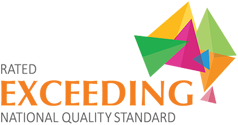We have developed our curriculum at Engadine Preschool Kindergarten based around the Early Years Learning Framework, 2011 (EYLF) and our sound knowledge of child development. We have a strong commitment to allowing children to play in a developmentally and challenging environment. We use play as the main tool of teaching our curriculum. Longitudinal studies of young children all over the world support the ideal that play based learning is indisputable in its effectiveness to teach skills, knowledge and dispositions of learning in young children.
We have broken our curriculum into these three main areas of learning for ease of understanding. They are the skills, knowledge and dispositions to learning that we will be covering throughout your child's enrolment. These are then broken into different elements or intentional teaching elements. These elements have been discussed at length by all members of the educational team, and we are all working towards achieving these elements within the daily program for your children.
From birth, we are all trying to make sense of the world. Children spend much of their time gathering information and creating ideas, opinions and coming to conclusions based on their own unique experiences. They set themselves goals, explore different ways of achieving these goals, and understanding when they achieve them. Children view the world as a place of wonder and experimentation: they have natural curiosity and will constantly question how, what, where and why?
We need to nurture and encourage this natural tendency, and work to create the ideal environment for thinking skills to flourish.
Thinking about thinking skills at every stage in children's learning can help us to:
- Give children the time and space they need to discover the world in which they live;
- Recognise how important it is to treat children as individuals who progress at different rates - not just in relation to their age;
- Ensure that parents know and understand that education is not purely about facts and rote learning;
- Provide children with transferable skills - in enquiry, information processing, reasoning, evaluation, problem solving and creative thinking - that they can use in order to achieve in all areas throughout their time in school and beyond.
The early years are very important because most of the growth of the brain occurs in early childhood. By the age of six, the brain in the majority of children is 90% of its adult size. It is vital to introduce and encourage thinking skills at this stage rather than waiting until later when brain development is slowed.
(Clarke, 2007)

